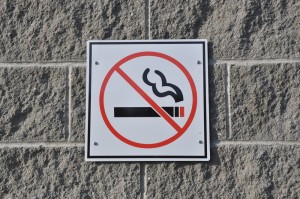
Smoking cessation is a priority for public health because it makes such a difference to health outcomes for the general public, which reduces the burden on health services, allowing for investment in health conditions which are less preventable. People with mental health problems are three times more likely to be nicotine dependent compared to the rest of the population.
However, when entering a secure unit for specialist care, there is an opportunity to participate in smoking cessation interventions. This is a priority for public health, but an extremely controversial area for mental health service users who may be forcibly detained in an inpatient facility and told that they have to stop smoking because the hospital is now smoke free.
Our woodland cousin the Mental Elf has covered this topic in detail and we encourage readers to check out some of the other evidence in this field by reading some of these blogs:
- New NICE guidance recommends that all NHS hospitals and clinics become completely smoke-free
- The effect of smoke-free psychiatric hospitals on smoking behaviour: more evidence needed
- Promoting smoking cessation in people with schizophrenia
- Sustained smoking cessation intervention for hospitalised smokers
- All National Elf Service smoking cessation blogs
Public Health England has published new guidance for commissioners to help them support providers in creating smoke-free environments for people suffering from mental health problems. It is particularly relevant to secure mental health units.

Eleven recommendations are made, for commissioners and providers to implement within mental health secure units.
Recommendations for smoke-free mental health secure units
The guidance is designed to complement other guidance and legislation, such as NICE public health guidance PH48: Smoking cessation in secondary care: acute, maternity and mental health services. Eleven recommendations are made, for commissioners and providers to implement within mental health secure units:
- Contracting levers – embedding smoking-related performance indicators, such as CQUINS in contracts, so that organisations have clear targets.
- Guidance – commissioners and providers should make sure that all the relevant guidance (listed on page 18 of the document) is applied and applied to service delivery.
- Legal and ethical duties – as with applying the relevant guidance, commissioners and service providers should be aware of relevant legislation, and this is helpfully listed on page 19 of the document.
- Robust project management – to ensure the smooth implementation of smoke-free policies, it is recommended that a project monitoring approach is taken, and advice is provided in greater detail, on how this can best be achieved, particularly with regards to monitoring and evaluation.
- Trust undertake self-assessment – this will help organisations develop a policy that suits the local environment, and Public Health England have developed a tool specifically for this purpose (see Related Links below) and additional support is available by telephone or email.
- Reinforcing the public health messages – Chapter 4 highlights the key benefits of giving up smoking and commissioners and service providers need to relay the messages to service users effectively and consistently so that they can recognise how smoking cessation can improve their well-being.
- Care pathways – this is similar to the first recommendation, contract levers, but focuses specifically on making sure that mental health secure units have clear care pathways, supported by NICE guidance, with regards to smoking cessation.
- Medication use – it is vital that service providers understand the positive impacts that smoking cessation has on psychotropic medication use, not just in terms of the individual, but also for Trust finances.
- Training – while this document contains a useful range of supporting material, described further in the next paragraph, it is important that all staff, particularly those at the front-line be trained about how best to implement smoke-free policies and smoking cessation programmes.
- Staff culture –it is essential that staff also be supported when giving up smoking, not only for their benefit, but also to demonstrate to service users the benefits of quitting. NICE has published guidance on giving up smoking in the workplace (PH5).
- Weight management – a common side effect of giving up smoking is weight gain, and as part of smoking cessation programmes and smoke-free environments, it is important that service providers put in place strategies for managing weight gain and preventing obesity.

Do you have experience of a smoke-free Trust policy being implemented in your local area? Please share your thoughts in the comments thread below.
Supporting material to overcome barriers
The guidance contains a useful package of supporting material, including:
- Two case studies from successful implementers of smoking cessation interventions in secure units.
- The results of a survey describing the current application of smoke-free policies and smoking cessation interventions in 105 medium and low secure services in England.
- A list of potential challenges that commissioners and providers might face when trying to implement a smoke-free policy, together with evidence-based responses.
Commentary
This document is very useful to commissioners and service providers, because it clearly explains what the issue is, what needs to be done, and how they can work together to implement smoke-free policies and smoking cessation programmes effectively. The authors have recognised the issues, but have provided tools to overcome those issues. As commissioners, the first step is to look at this guidance and the related guidance and legislation and see if the contracts you have with your providers have the relevant levers and standards in place. If not, then work together to see what can be done to remedy the situation.
Developing a smoke free policy can be a contentious issue, particularly in a mental health environment, where the focus is to manage stress, rather than cause it. Smoking is a recreational drug, and not everyone will be happy about giving up. However, by creating an environment which is pleasurable without the need to smoke, and providing relevant support, in terms of counselling, replacement therapy, physical activity, health benefit awareness, service providers can make a big difference to the individual, the local organisation, and public health as a whole.

Forcing mental health patients to stop smoking is even more emotive and controversial than culling badgers. Please share your thoughts with us!
Link
Day M, Garnham H. (2015) Smoking cessation in secure mental health settings: Guidance for commissioners. London: Public Health England
Related links
NICE guidance smoking cessation in secondary care in mental health settings: self-assessment tool
NICE guidelines PH5 (2007) Workplace interventions to promote smoking cessation


